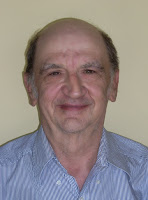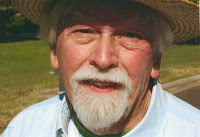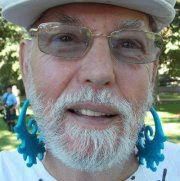“Look! It’s George Clooney!” I was startled and quickly checked to see where the speaker was looking. There was no third person present. He was looking at me! A case of mistaken identity. The very next week, a trio of ecstatic teenage girls screeched, “Justin Bieber!” Again, I immediately looked right and then left, astonished that Justin Bieber would actually be in my presence without my having noticed. He wasn’t there; the girls were looking at me. Again, mistaken Identity!
No, of course that did not really happen. No one ever has mistaken me for someone famous. I don’t resemble any of them. Instead, I probably look more like the fictional person Dave Letterman jokes about, the old curmudgeon who shouts at the kids, “Get off my lawn, and take that mangy dog with you…and that dump that it just left on my grass!”
Instead, let me tell you about a remarkable story of truly mistaken identity, one that has been made into an excellent quality film and subsequently released on DVD. I have shown it to friends. I’ll tell you just enough of the story’s background, but I’ll leave the best bits for you to see for yourselves. It’s title is “AKA,” that is, an assumed name, an assumed identity. This actually did happen in 1978, and it is an autobiographical tale by writer and director Duncan Roy.
The main character is named “Dean” rather than Duncan. His advantages are that he is a very handsome seventeen-year-old with high intelligence, capable of being a fast study, and he possesses a quiet, pleasing personality. His disadvantages, however, are several and profoundly debilitating. He comes from a very poor and poorly educated home with an unseeing, ineffectual, dysfunctional mother and a father from hell who intimidates and abuses both mother and son but, also, who has had a history of frequently raping the boy even to the extent of occasionally allowing a buddy to engage in the abuse. The sad and painful consequence is that Dean’s feelings and thinking become severely distorted to the extent that he cannot relate emotionally or sexually to either females or males. If people express sexual interest in Dean, he equates that interest with rape, whether he allows them to proceed or not.
Two other points influenced Dean’s personality and his future. He had hoped to be somebody, to go to college and to make something of himself, although this was disdained and unsupported by the working-class father. The other influence was that his mother’s employment was as a waitress at a trendy London restaurant frequented by Britain’s aristocratic élite. His mother provided Dean with a daily run-down of which celebrities had appeared at the restaurant, and she would sit at the kitchen table with him, pouring over the gossip magazines, pointing out pictures of various aristocrats including a Lady Gryffoyn, who ran an art gallery as a hobby.
To prevent the mother’s belated discovery of his sexual abuse, the father throws Dean out of the house without money or any place to go. Dean wanders about Lady Gryffoyn’s up-scale neighborhood, hoping to find her and ask for a job. Instead, he is picked up by an aging ingénue who sees Dean as obviously quite young and very innocent. Dean stays for dinner, meets other guests who turn out to be outrageous queens who adore him for his youth and good looks. They make quite a fuss over him. He consequently feels appreciated and accepted for the first time in his life. This is the beginning of Dean’s transformation.
Dean tries for a menial job at the art gallery. On one hand, Lady Gryffoyn is an arrogant bitch, not used to doing anyone favors; however on the other hand, she had a reputation for enjoying the company of very young men. He lands a job, gradually is accepted more and more by Lady Gryffoyn to the point of being allowed to hang about the house and to meet her aristocratic friends, and even at times to wear her son’s clothes while there. Dean acquires bank credit and a credit card, privileges that he has no experience or desire to handle responsibly. In this pre-computer age, he is able quickly to run up a large debt, acquiring the clothes and accoutrements of a gentleman.
Eventually, Dean meets Alexander, Lady Gryffoyn’s son, who is the same age as Dean. Alexander is even more arrogant and disdainful than Lady Gryffoyn and verbally abuses Dean. Dean quickly learns that this gentrified class habitually identifies their own kind by expensive, tailor-cut apparel, posh accent, sophisticated demeanor, how much money they are willing to throw about without the least concern, what private schools the young have attended, and whether the lads will be attending Oxford or Cambridge, at least to receive an easy “gentleman’s degree.” They cruelly disdain everyone else. Dean is painfully ill-at-ease and unsure of himself, but he quietly watches and listens. His ability as a quick study begins to pay off. Briefly left alone in the house, he explores Alexander’s suits, photos, along with anything he encounters that deals with Alexander’s life. He loses his identifying working-class accent and gradually learns to imitate the sophisticated accent of British élite.
Not permitted to remain at the London house and having attracted the attention of the fraud squad, Dean takes the advice of a young American gigolo to go to Paris. The major turning point of Dean’s story is when he attempts to gain a job at a Paris art gallery but has had little experience and does not speak French. He is dismissed with the polite but not encouraging statement, “I’ll take your name.” After some hesitation, Dean finally says, “Alexander Gryffoyn.” The gallery owner immediately springs to his feet and, with a great smile, welcomes Dean with open arms. The aristocratic name works magic and opens all doors.
Step by step, with the right clothes, the appropriate accent, and occasional little white lies, Dean is introduced to the crème de la crème of Continental élite. This cream of society, however, is repulsively curdled. These people are the sort often referred to as “Euro-trash.” Some of them are British tax expatriates, avoiding paying taxes on their fortunes. Others are remnants of European nobility, people with money but with no purpose in life other than to feel important and to party endlessly. Alcohol flows, and cocaine is consumed as a matter of course.
What continues to happen in Dean’s life for more than a year becomes even more remarkable and fascinating. Popular, adored, catered to, Dean loves being, as his embossed invitations read, “Lord Alexander Gryffoyn.” To his sorrow, however, he never has been accepted and loved as Dean, his real self.
He eventually goes back to Britain to face the music. His identity theft makes the news, replete with many photos of himself posing as Alexander. Despite his having lived for a while under an identity that was false and not his true self, Dean ironically concludes that, in contrast to that snobbish SOB Alexander, he, Dean, had been a far better “Lord Alexander Gryffoyn” than the real one ever could hope to be.
This is all the teaser that I am going to give to you. For you to enjoy all the most remarkable bits of the story, as well as see the more intimate scenes, if that is your “cup of English tea,” watch the DVD. It is an amazing story of mistaken identity, well worth seeing. And frankly, Dean himself is worth seeing. I wouldn’t mind being mistaken for him.
© 9 January 2013
About the Author
I have had a life-long fascination with people and their life stories. I also realize that, although my own life has not brought me particular fame or fortune, I too have had some noteworthy experiences and, at times, unusual ones. Since I joined this Story Time group, I have derived pleasure and satisfaction participating in the group. I do put some thought and effort into my stories, and I hope that you find them interesting.




